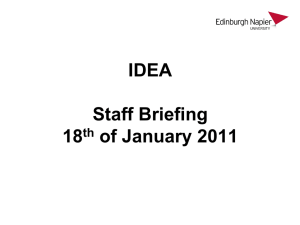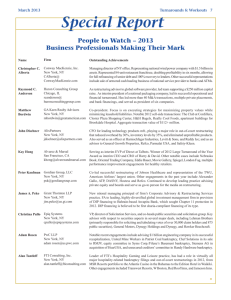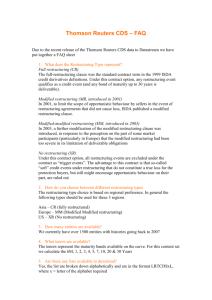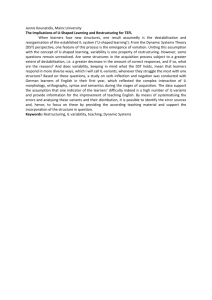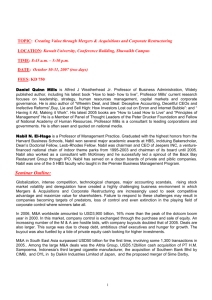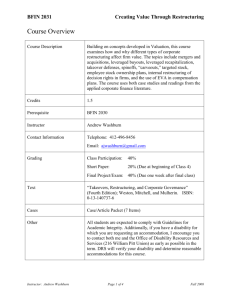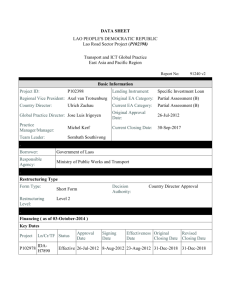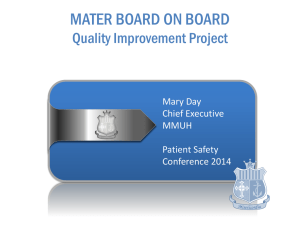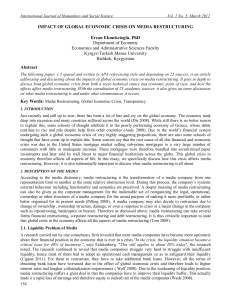restructuring-ewc-2005-final
advertisement
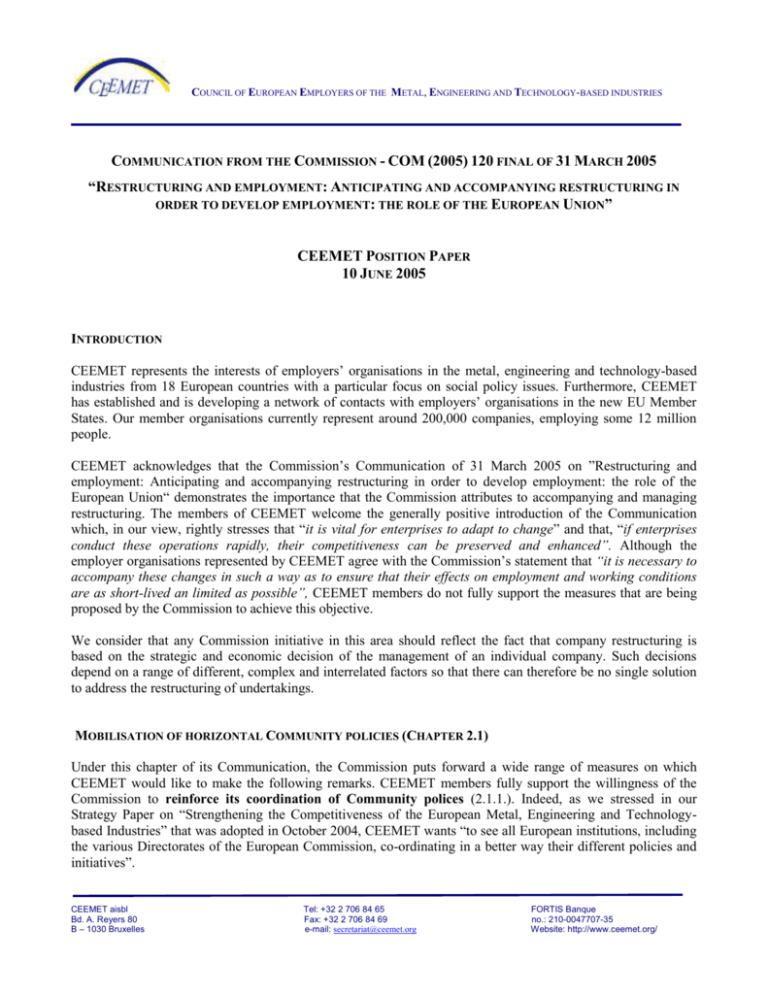
COUNCIL OF EUROPEAN EMPLOYERS OF THE METAL, ENGINEERING AND TECHNOLOGY-BASED INDUSTRIES COMMUNICATION FROM THE COMMISSION - COM (2005) 120 FINAL OF 31 MARCH 2005 “RESTRUCTURING AND EMPLOYMENT: ANTICIPATING AND ACCOMPANYING RESTRUCTURING IN ORDER TO DEVELOP EMPLOYMENT: THE ROLE OF THE EUROPEAN UNION” CEEMET POSITION PAPER 10 JUNE 2005 INTRODUCTION CEEMET represents the interests of employers’ organisations in the metal, engineering and technology-based industries from 18 European countries with a particular focus on social policy issues. Furthermore, CEEMET has established and is developing a network of contacts with employers’ organisations in the new EU Member States. Our member organisations currently represent around 200,000 companies, employing some 12 million people. CEEMET acknowledges that the Commission’s Communication of 31 March 2005 on ”Restructuring and employment: Anticipating and accompanying restructuring in order to develop employment: the role of the European Union“ demonstrates the importance that the Commission attributes to accompanying and managing restructuring. The members of CEEMET welcome the generally positive introduction of the Communication which, in our view, rightly stresses that “it is vital for enterprises to adapt to change” and that, “if enterprises conduct these operations rapidly, their competitiveness can be preserved and enhanced”. Although the employer organisations represented by CEEMET agree with the Commission’s statement that “it is necessary to accompany these changes in such a way as to ensure that their effects on employment and working conditions are as short-lived an limited as possible”, CEEMET members do not fully support the measures that are being proposed by the Commission to achieve this objective. We consider that any Commission initiative in this area should reflect the fact that company restructuring is based on the strategic and economic decision of the management of an individual company. Such decisions depend on a range of different, complex and interrelated factors so that there can therefore be no single solution to address the restructuring of undertakings. MOBILISATION OF HORIZONTAL COMMUNITY POLICIES (CHAPTER 2.1) Under this chapter of its Communication, the Commission puts forward a wide range of measures on which CEEMET would like to make the following remarks. CEEMET members fully support the willingness of the Commission to reinforce its coordination of Community polices (2.1.1.). Indeed, as we stressed in our Strategy Paper on “Strengthening the Competitiveness of the European Metal, Engineering and Technologybased Industries” that was adopted in October 2004, CEEMET wants “to see all European institutions, including the various Directorates of the European Commission, co-ordinating in a better way their different policies and initiatives”. CEEMET aisbl Bd. A. Reyers 80 B – 1030 Bruxelles Tel: +32 2 706 84 65 Fax: +32 2 706 84 69 e-mail: secretariat@ceemet.org FORTIS Banque no.: 210-0047707-35 Website: http://www.ceemet.org/ As regards the reform of the European Employment Strategy (EES) (2.1.2.), CEEMET supports the emphasis that is being put by the Commission on the employment policy framework having the following three priorities: to attract and retain more people for the labour market, to improve the adaptability of workers and companies, and to invest more in human capital. On the reform of Community financial instruments for better anticipation and management of restructuring (2.1.3.), the Commission mentions the need to refocus the Structural Funds on the objectives of the Lisbon Agenda as well as the creation of contingency reserves and CEEMET, in principle, welcomes this change in emphasis. CEEMET supports the Commission’s intention to continue implementing the revamped industrial policy (2.1.4.) that was presented in April 2004, especially through the improvement of the regulatory framework applicable to companies with a view to supporting their innovation and competitiveness activities. However, CEEMET believes that the Commission’s desire to ensure more attentive follow-up in sectors which are likely to experience significant changes in the short term requires a prudent approach. Whilst CEEMET can support the idea of “analysing the development of competitiveness, environmental threats and opportunities, consequences at regional level, and measures likely to be taken at Community level to anticipate and accompany change for these sectors”, we urge the Commission to ensure the autonomy of social partners when it comes to the involvement of European sectoral social dialogue committees on education and training issues. Furthermore, CEEMET would want to be involved in the preparation of the Communication which is currently being prepared on the sectoral dimension of industrial policy particularly as this study will also deal with social policy topics and focus on two sectors that are covered by CEEMET members, namely the shipbuilding and the car industries. STRENGTHENING THE PARTNERSHIP FOR CHANGE (CHAPTER 2.2.) Under this chapter the Commission has set out three measures which are of particular concern to CEEMET. As far as the strengthening of Sectoral Social Dialogue is concerned, CEEMET would like to stress the importance of the Commission fully respecting the autonomy of the social partners. It is up to the Sectoral Social Dialogue Committees to decide on the issues they want to discuss. The Commission has also indicated that it will be tabling a Communication on Corporate Social Responsibility (CSR). On this issue, we would like to remind the Commission that the Multi-Stakeholders’ Forum on CSR agreed in its conclusions of June 2004 that CSR should remain voluntary. CEEMET fully supports a voluntary approach to CSR and would therefore be very concerned if the Commission’s desire to enhance the “credibility” and “transparency” of CSR initiatives led to the introduction of the requirement for “external certification” and “auditing” as this would clearly be contrary to the voluntary principle. Finally, CEEMET does not see the added value that would be gained by the Commission setting up a “Restructuring” Forum. The European Monitoring Centre on Change (EMCC) has already been set up to collect information on the management and anticipation of change / restructuring and to disseminate this information and in our view setting up a new Forum would simply duplicate the work of the EMCC. ADAPTING THE FRAMEWORK OF REGULATION AND AGREEMENT (CHAPTER 2.3) As stated in our recent position paper on the Commission’s “Social Agenda”, CEEMET can only support the idea of regulatory modernisation and simplification measures as proposed in the Communication if this results in genuine simplification and does not create more stringent legal obligations for employers. CEEMET recognises that, over recent years, new forms of work have emerged and we feel that these should be positively encouraged as the first Kok Report “Jobs, jobs jobs: creating more employment in Europe” states. It will therefore be important to ensure that any Commission Green Paper “analysing current trends in new work patterns and the role of labour law in tackling these developments” does not lead to further legislative proposals at European level that undermine the necessary development of these new forms of work. Finally, CEEMET has noted that the Commission is planning to publish a proposal for a Directive on the improvement of the portability of supplementary pension rights. We, in principle, support such an initiative which could facilitate the cross-border mobility of workers and will want to comment on this document because of its potential impact on CEEMET members. SECOND PHASE CONSULTATION ON COMPANY RESTRUCTURING AND EUROPEAN WORKS COUNCIL (CHAPTER 2.4) In 2003 and 2005, UNICE and ETUC adopted two joint documents under the framework of the 1st stage consultation on “anticipating and managing change” and on “the possible review of the European Works Council Directive”. Although CEEMET welcomes the fact that the Commission is not proposing any new legislative measure on these two issues, it is disappointed that the Commission does not consider the work undertaken by the European social partners to be sufficient and is calling for more joint actions to be taken and for new negotiations to be opened on these issues. CONCLUSIONS CEEMET believes that the European Commission has an important role to play in creating and sustaining a business and economic environment that supports the implementation of the structural changes that are necessary for the development of a competitive and dynamic European economy, prerequisite of social progress. We consider that the extensive range of legislative instruments that already exist at both European and Member State level in connection with the management and anticipation of restructuring processes means that there is no case for any further legislative interventions to be initiated by the European Commission. CEEMET is also convinced that existing European as well as national regulations should be checked against the principles of "effectiveness and simplification".
